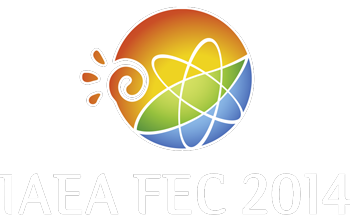Speaker
Dr
Tamara Andreeva
(Max-Planck-Institut für Plasmaphysik, Teilinstitut Greifswald, Germany)
Description
Wendelstein 7-X, currently under construction at the Max-Planck-Institut für Plasmaphysik in Greifswald, Germany, is a continuation of the helical advanced stellarator line, with the final goal to demonstrate the reactor capability of modular stellarators. The magnet system of the machine consists of 50 non-planar and 20 planar coils, which are arranged in five identical modules.
If the symmetry of the five magnet system modules is violated, magnetic field perturbations occur which lead to uneven loads on the divertor targets and affect the plasma performance. Such perturbations are unavoidable due to manufacturing and assembly tolerances as well as due to coil deformations during the assembly process and machine operation.
In order to compensate for the impact of manufacturing and positioning errors, a step-by-step optimization of the Wendelstein 7-X module positioning on the machine base was performed. It helped to avoid error field accumulations during assembly and resulted in a significant reduction of the magnetic field perturbation as well as in saving assembly time concerning possible readjustments.
In addition, finite element calculations were performed to evaluate the magnet system deformations during machine operation, caused by asymmetries of the magnet system structure and its supports. Corresponding magnetic field perturbations were assessed for cases where coils were deformed according to structural analysis results and also for random deformations.
The sequential torus assembly procedure with removal of temporary supports after module positioning on the machine base also leads to non-symmetrical coil deformations. This was simulated with finite element methods for all 70 coils. Results of this analysis complement the full overview of relevant sources of magnetic field perturbations in Wendelstein 7-X.
The paper summarizes all calculations performed for an evaluation of the Wendelstein 7-X magnetic field perturbations, shows a comparative analysis for different sources of error fields and demonstrates that the compromise between physical needs and engineering challenges can be successfully met with help of the installed Wendelstein 7-X compensation tools (trim coils).
| Country or International Organisation | Germany |
|---|---|
| Paper Number | FIP/P8-19 |
Primary author
Dr
Tamara Andreeva
(Max-Planck-Institut für Plasmaphysik, Teilinstitut Greifswald, Germany)
Co-authors
Dr
Felix Schauer
(Max-Planck-Institut für Plasmaphysik, Teilinstitut Greifswald, Germany)
Dr
Johann Kißlinger
(Max-Planck-Institut für Plasmaphysik, Germany)
Dr
Joris Fellinger
(Max-Planck-Institut für Plasmaphysik, Teilinstitut Greifswald, Germany)
Mr
Konstantin Egorov
(Max-Planck-Institut für Plasmaphysik, Teilinstitut Greifswald, Germany)
Mr
Matthias Köppen
(Max-Planck-Institut für Plasmaphysik, Teilinstitut Greifswald, Germany)
Dr
Michael Endler
(Max-Planck-Institut für Plasmaphysik, Teilinstitut Greifswald, Germany)
Dr
Torsten Bräuer
(Max-Planck-Institut für Plasmaphysik, Teilinstitut Greifswald, Germany)
Dr
Victor Bykov
(Max-Planck-Institut für Plasmaphysik, Teilinstitut Greifswald, Germany)

